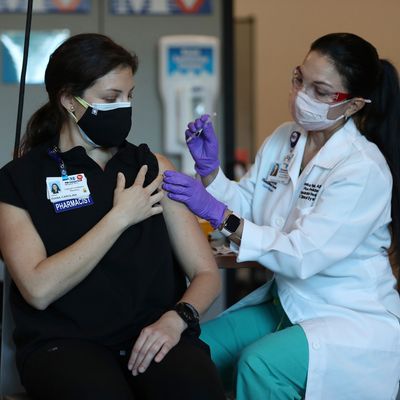
Over the weekend, after initial fears that pregnant and lactating health-care workers would be barred from receiving the COVID-19 vaccine because of a lack of safety data from clinical trials, the FDA and the CDC instead left the door open for them to choose. What comes next will fall on the institutions distributing the vaccines, and the individual health-care worker having to decide as early as next week whether to get that shot, based on limited information.
“We’re delighted,” said Ruth Faden, the founder of the Johns Hopkins Berman Institute of Bioethics, who, along with her colleagues, had advocated for pregnant and lactating health-care workers to be able to opt in to receiving the vaccine. She was alarmed when British health authorities categorically said pregnant and lactating women shouldn’t take the vaccine, even though pregnant women are at a higher risk of severe disease. Instead, she advocates for taking into account each patient’s level of risk, which, for pregnant health-care workers on the front lines of caring for COVID patients, could tend toward vaccination.
At the same time, Faden added, “I hate this outcome. I don’t like the fact that the burden of decision-making will fall to individual women. I wish we had an absolutely unambiguous recommendation.” You can’t say she didn’t try. The same Hopkins trio had first called way back in February for pregnant women to be included in clinical trials for the vaccine.
In its new practice advisory, issued Sunday immediately after the federal agencies met, the American College of Obstetricians and Gynecologists (ACOG) says it “recommends that COVID-19 vaccines should not be withheld from pregnant individuals who meet criteria for vaccination,” which is different from saying they recommend pregnant people take it. It recommends people talk to their doctors and take into consideration how much virus is in their community and their risk factors if they get COVID.
And the advisory leaves the door open to pregnant people who are uncomfortable with the unknown: “Pregnant patients who decline vaccination should be supported in their decision.”
Advocates for pregnant patients hope that by the time the general public get access to the vaccines next year, more data will put those with safety concerns at ease. Pfizer, whose vaccine was the first to be authorized for widespread use in the U.S., has said its preliminary studies on pregnant animals haven’t raised any issue of fetal harm. And they have an accidental data pool in the people who participated in phase two and three of the vaccine’s clinical trial this past year — a handful got pregnant accidentally and are being tracked now. Formal trials of the vaccines from Pfizer and Moderna (expected to be authorized next) with pregnant people are expected to begin as early as the first quarter of 2021. “Every week, or at least every several weeks, should bring us more data,” Faden said.
Though often yoked with pregnant patients, ACOG’s advisory treats breastfeeding differently; it says “vaccines should be offered to lactating individuals similar to non-lactating individuals when they meet criteria for receipt of the vaccine based on prioritization groups.” Faden is blunter: “The prospect that someone would either lie or not breastfeed to get a vaccine was crazy … I certainly wouldn’t even hesitate to get it if I were breastfeeding now, if I otherwise wanted to get the vaccine.”
That’s how Hillary Spencer, a pediatrician specializing in infectious diseases and trained in preventative medicine, sees it. She’s breastfeeding her 18-month-old child, and happy to have the choice whether to be vaccinated. “I was a little bit concerned about how my institution might make the decision whether to offer the vaccine to lactating women,” she said. (She’s currently a fellow at Vanderbilt University and stressed she is only speaking for herself.)
While Spencer isn’t sure what she would do if she were pregnant, she took me through her thinking for herself, based on research and her expertise. She pointed out that in general, “very rarely are vaccines are contraindicated for pregnant women, and the circumstances where they are is when they’re live attenuated virus.” Pfizer’s mRNA vaccine, by contrast, is “novel, but there’s no virus in it, it’s just code. There’s no risk of causing infection from it.” Describing how the virus gets “taken up in muscle cells, it doesn’t circulate in your body, and mRNA gets degraded really quickly,” she said. “I don’t think there’s a mechanism for this to get into breast milk.”
Finally, there’s a benefit to the baby, Spencer figures, though she doesn’t see a mechanism for the coronavirus antibodies to reach breast milk. “A lot of the rhetoric in the health-care world is the analogy to putting on your oxygen mask when you’re in a plane,” she said. “You have to take care of yourselves so we can continue to take care of patients.” The same, Spencer reasons, is true for health-care workers who are parents.






























